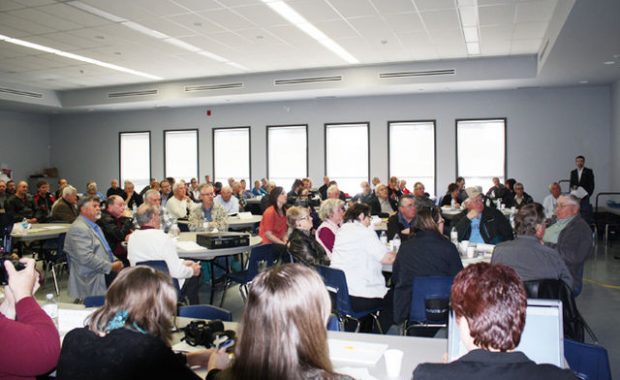Madawaska – A number of community members, anglers, fishers, cottagers and council members gathered on April 6, to voice concerns in regards to the recent Algonquin Land Claim Agreement-in-Principle (AIP).
The Township of South Algonquin hosted the event at the Madawaska Valley Community Hall, which included representation from nearly 10 different municipalities.
Members of several councils, from South Algonquin, Madawaska Valley, East Ferris, North Bay, Killaloe, Hagarty and Richards, to Hastings and Highlands surrounding areas made the trip early Saturday morning to attend – and to get answers, many had hoped. MPP John Yakabuski and MP Cheryl Gallant were also in attendance.
Non-Algonquin persons will also have to live with this decision, Joe Florent, a South of Algonquin Township councillor outlined beginning the day.
The reason for this meeting is so community members of councils from across municipalities, within the land claim area, can come together and hopefully create a voice that will carry some weight, Florent went on to say.
Mayor for South Algonquin Township, Jane Dumas, who also helped organize the event, added, it’s about informing one another.
Manager of Government Affairs and Policy for the Ontario Federation of Anglers and Hunters (OFAH), Greg Farrant spearheaded the meeting.
The gathering included a brief presentation from Farrant, followed by a more in-depth presentation from Matt Demille, assistant manager of fish and wildlife services for the OFAH, followed by a question-answer period, which included numerous speakers.
At the core of the meeting, the repeated theme was not that individuals were angered with the actual AIP – but at the lack of information made available to the public, several attendees went on to say.
No one is disputing the actual land claim, or the Algonquins’ rights to lands, Farrant said.
More so, people want to know how the AIP will affect them, he continued.
The preliminary draft agreement, released on December 13, will transfer no less than 117,500 acres of Provincial Crown Land in Ontario to one or more Algonquin Institutions. This land package consists of more than 200 parcels of land, ranging in size from a few acres, to more than 30,000 acres.
Nearly 1.4 million people live and work within the designated land claim areas, Farrant explained. What’s more, many more use the lands recreationally, he added.
Demille, throughout his presentation, outlined how the transfer of public lands would impact individuals in a vast array of ways.
From public fishing, and hunting, to accessibility and wildlife concerns – the land transfers from public to private, will affect Ontario’s culture, Demille continued.
“These land transfers will affect our quality of life,” he said.
Existing people on these lands, will be displaced, Demille went on to say.
What’s more, about eight public stocked lakes with all types of fish will become private.
“Will we have access to these lands afterwards – we don’t know,” Demille said.
Yet, hunters and anglers have paid for these waterways to be stocked through their license fees, the OFAH manager elaborated. Adjacent lands, to claimed lands, and provincial parks may also have restrictions when the AIP moves into its final draft, he continued.
Technically, there are about 39 parks within the land claim boundaries – 16 of those provincial parks will change and be co-managed by Algonquins of Ontario – yet, no one truly understands how they’ll change, and that is the issue here, Demille stressed.
Many of the lands to be transferred are also high quality locations. Several locations are prime real estate with great values for recreational users. Lands might include deeryards or high-quality moose habitats, the spokesperson for OFAH explained.
Story continues in the April 10, 2013 issue of The Valley Gazette.
